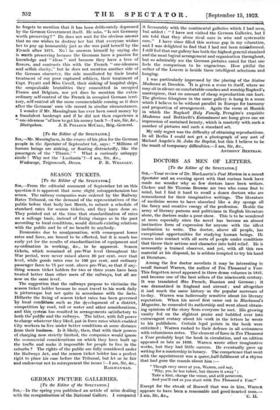DOCTORS AS MEN OF LETTERS.
[To the Editor of the SPECTATOR.] SIR,—Your review of Dr. MacLaurin's Post Morten: in a recent Spectator and an evening spent with that curious book have made me wonder why so few doctors have been writers. Chekov and Sir Thomas Browne are two who come first to mind, but I find it hard to recall a dozen doctors who are remembered for their imaginative writings. The literature of medicine seems to have absorbed like a dry sponge all the fancy and creative energy of the profession. Beside the army of literary parsons and politicians in English literature alone, the doctors make a poor show. This is to be wondered at more especially since the novel has become an almost instinctive form of expression for anyone with the idlest inclination to write. The doctor, above all people, has exceptional opportunities for studying human beings. He comes into contact with all sorts of people under conditions that throw their actions and character into bold relief. He is necessarily a trained observer, and yet, with all this raw material at his disposal, he is seldom tempted to try his hand at literature.
Among the few doctor novelists it may be interesting to recall Samuel Warren, the author of Ten Thousand a Year. This forgotten novel appeared in three dense volumes in 1841; and became one of the best sellers of the nineteenth century. It was translated Mt° French, Russian and German ; it was dramatized in 'England and abroad ; and altogether it had much the same history • as the popular successes of to-day. Warren was ludicrously sensitive about his literary reputation. When his novel first came out in Blackwood's Magazine, he concealed its authorship and went about obtain- ing opinions of the story from everyone he met. His growing vanity fed on the slightest praise and bubbled over into extravagant ecstasy about his work in the letters he wrote to his publishers. Certain legal points in the book were criticized ; Warren rushed to their defence in all seriousness with voluminous notes. The element of farce in Ten Thousand a Year probably kept the book in circulation, and an 'edition appeared as late as 1899. Warren wrote other imaginative works, but they had little success. He eventually gave up writing for a mastership in lunacy. The competence that went with the appointment was a queer, half-fulfilment of a rhyme that had gone the rounds about him :— "Though envy sneer at you, Warren, and say,
'Why, yes, he has talent, but throws it away ' ; Take a hint, change the venue, and still persevere,
And you'll end as you start with Ten Thousand a Year."
Except for the streak of Boswell that was in him, Warren appears to have been a reasonable and good-hearted man.—


































 Previous page
Previous page